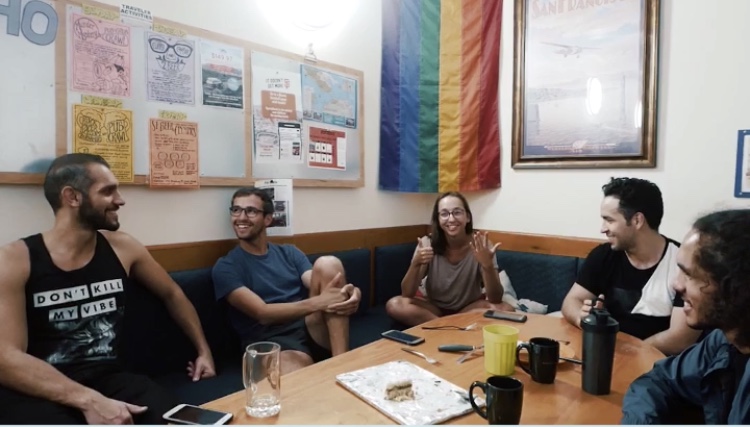Safety Tips for Work/Exchange in Hostels: Everything You Need To Know

A few weeks ago, we told you about a new travel trend that’s helping thousands of travelers see the whole world - while barely spending any money at all. This trend is called “Slow Travel,” a.k.a the practice of spending several weeks or months at a time in one city or country. One common way people are doing this is by helping out in hostels. Many hostels throughout the world offer free stays, sometimes to volunteers or in exchange for helping with reception, cleaning, events, and anything else around the property that could use an extra hand. Sometimes at small hostels, the owner may give a free stay simply because they like you. Really!
To be honest, the opportunities in hostels not always glamorous. Sometimes you may find yourself scrubbing toilets for a free hostel stay. Toilets or not, helping out in a hostel is AWESOME! You get to make friends from all over the world while experiencing the culture of another country at your own pace. We think everyone should see what this is like at least once.
Before you set out, there are some vital safety tips every traveler needs to know before they go (rhyme intended). We want you to travel the world as cheaply as possible - and as safely as possible.
After reading our last post, you hopefully have an idea about how to find free stay opportunities in hostels. This post will tell you six important things you need to know to do it safely.
1. Know What You’re Getting Yourself Into
No matter what type of opportunity you are going to the hostel for - paid work, volunteering, work exchange or something more informal - if you are traveling to a far off land for the sole purpose of THIS hostel opportunity, make sure you have a solid understanding of what’s going to be asked of you and what you are going to get out of the arrangement in return.
If it’s a paid job, make sure your job description and promised compensation are spelled out in writing. After all, you are going to be making a big investment in transportation costs to get there. The last thing you want when you get there is to find out the work is a lot more demanding, or the compensation is not what you had budgeted for. Ask questions about where the hostel is located, the neighborhood, how safe it is at night, what other staff do when they are not working, and anything else you might be concerned about.
The same principles go for volunteering and work exchange. Ask how much time and effort will be expected from you and how much time you will have off to explore and enjoy the destination. Ask what meals (if any) will be provided and what the accommodations are like. Ask to see pictures of where you will be sleeping and do not merely assume the accommodations will be the same as the guests receive. Nowadays, it’s easy for a hostel owner to show you all this during a Skype call. If they are cagey or apprehensive about doing it, be suspicious. Just because you are not paying for a bed does not mean it should be dirty or sketchy or not nice.
Over the years, we have heard some horror stories of travelers who have been promised one thing - and then flew half-way around the world to some remote destination to find that the situation was sub-par or even downright scary. For this reason, and because you never really know for sure if someone is telling the truth in advance of your arrival or not, we personally don’t think arranging any kind of hostel opportunity (paid or otherwise) in other countries before you get there is the best way to work your way around the world.
Instead, it’s far better to travel independently with your own funds without having to rely on the promise of a job or hostel opportunity. When you get to hostels, be friendly and helpful and get to know the manager and the community of travelers there. If you like the vibe at the hostel, ask around and see if any discounts are available for longer stays. Chances are, if you are helpful and nice to have at the hostel, they will figure out a way to keep you around.
Photo credit: ROTABlueShow
2. Research the hostel's online reputation
Never blindly agree to stay at a hostel without doing your homework. If the hostel does not have good guest reviews, there’s likely omething wrong with it. Before you make a reservation, go visit, or contact them about an opportunity, the first thing you should always do is look up their online presence. Scope their Instagram, take a look at their Facebook page, and read through their reviews on TripAdvisor and HostelWorld. You wouldn’t agree to move into a house or apply for a job without looking up the property or company first, would ya? Although a hostel opportunity is not a job or an apartment, it’s still somewhere you will be staying and spending your time. By looking at the reviews, you’ll be able to get an idea of what the hostel and management are like from a guest perspective to see if it's a good fit for you. If you are reviewing a hostel on a work-exchange or volunteer site, check the reviews from previous volunteers.
3. Research the visa requirements and laws of the country where you are planning to go
If you are planning to work or volunteer in hostels during your trip, thoroughly research the visa and guest worker laws of the countries you’ll be visiting. You can do this by Googling, asking other people who have been there, and/or by checking out this super handy-dandy guide provided by Working Traveller.
No matter what you find out in advance, the best source of this sort of information will usually be from the locals in the country you visit. This is another reason why it’s not always a good idea to arrange a working holiday in advance. A hostel owner might tell you over the phone that it’s totally fine to fly thousands of miles and work in their country as long as you meet this requirement or stay under this limit. However, after several weeks of working there, you might find out the law and culture of the country you are visiting are definitely not on your side.
We’ve heard of travelers not getting paid because after a month of working the business owner says, “Sorry, it’s not legal for you to work in our country so I can’t pay you.” This really can happen! There’s nothing you can do if you find out you’re a foreigner who has been working illegally. In our experience, there’s nothing like a face to face conversation with locals about these matters. Only then will you be able to read their facial expressions and get a sense of how honest they are being. Don’t get caught in a sticky situation!
3. Never rely on a promise more than you are willing to lose
One of the great things about work exchange for a bed is you are essentially getting “paid” each night after you’ve worked (by getting to sleep in a free bed). Under this arrangement, if you have to leave because the situation is sketchy or unsafe, you can simply pack your bags and go because you are owed nothing and you owe the hostel nothing.
Be wary of hostels that want you to “pay in advance for your bed” and refund you later. Likewise, if you are getting paid as a casual worker (in countries that allow this) you will need to assess for yourself how long you are willing to work before getting paid. Casual workers usually do not have the same resources and ability to be helped that legitimate employees in that country may have.
Lastly, we have also heard of hostels that charge a “security deposit” to volunteers usually to “make sure you will give proper 2 weeks notice in advance of your departure.” This doesn’t sit well with us either. If you are helping out around the hostel in exchange for a bed, you are not an employee, and the hostel should not be treating you this way. You always want to have the ability to leave if things go wrong without feeling like you have been ripped off.
4. Never do unsafe work
Occupational safety varies widely throughout the world. In developed countries, there are strict rules employers need to follow to keep their employees safe. However, in other countries, you are entirely on your own and will need to make your own decisions about what’s safe or what you are comfortable doing. Never compromise your safety just to make a buck.
For the most part, the sort of work you will be doing in a hostel is your typical reception, guest-greeting, and light hostel maintenance stuff. It’s unlikely you will be working in construction or a factory or anything like that. However, if you are ever asked to do complex work and you are not experienced enough to know and assess the risks, don’t do it! In this situation, your ignorance can kill you. Always be willing to leave the job if you find yourself in an unsafe situation. The rules and worker protections vary from country to country but you should know that even doing work that involves tools or climbing on a ladder could result in an injury that you will not be insured for.
5. Always make sure you have enough funds to support yourself (if things go wrong)
More often than not, everyone you encounter in a hostel will be lovely, like-minded travelers and you’ll be able to enjoy your time in an awesome community. But you never know how things will turn out. You should never let your travel funds dwindle to the point where you become dependant on a free stay opportunity as your only option to support yourself. Maybe someone at the hostel will turn out to be abusive, exploitative or creepy. Or maybe it won’t be that dramatic, but after a week or two, you’ll realize that the opportunity is very different than how it was advertised. You never know what will happen on the road, but that’s part of the excitement of traveling! Just make sure you have enough funds in your bank account to quickly pack your bad and keep moving things are getting weird.
6. Have an escape plan - just in case!
Most importantly, you should always have enough funds for a plane ticket to get the hell out of there if the opportunity isn’t exactly what you thought it was. If you don't have funds to support an escape plan you will feel destitute, trapped and powerless to leave a bad situation.
Every single time you leave your home country you should always make sure you have, at the very least, enough money or an emergency credit card for a quick plane ticket home. You never know what can happen.
Safe travels!



